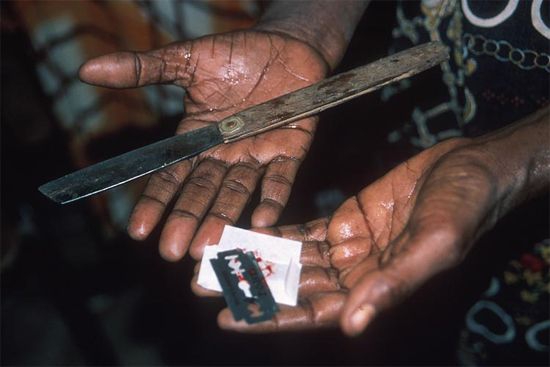Toyin Saraki: I have seen with my eyes harm caused by female genital cutting

I have seen with my eyes the harm caused by this archaic practice. Women who have undergone the procedure commonly experience complications during birth, and are at a greater risk of ceasarian section, hemorrhage, obstetric lacerations and prolonged labour”.
With these words, the wife of the Senate President, Mrs Toyin Saraki, challenged sexist attitudes and a misunderstanding of the facts surrounding the health risks associated with female genital cutting. Toyin, who is also the President of Well-Being Foundation (WBF), a non-governmental organisation, spoke on the occasion of the celebration of the UN’s International Day of Zero Tolerance for Female Genital Mutilation (FGM) last week.
‘’We reflect upon female genital mutilation (FGM), defining this cultural practice, addressing its harmful implications, and seeking resolution on this dangerous, damaging and sadly all too prevalent issue,’’ she said. Extracts from her statements:.
FGM, also known as female genital cutting and female circumcision, is the ritual removal of some or all of the external female genitalia. The practice is common across much of Africa and the Middle East, and is practiced in some parts of Asia, and among diaspora populations in Western countries. Somalia is thought to have the highest prevalence of FGM in the world, with 98% of girls affected. In my homeland of Nigeria, it is believed around 20 million girls and women have undergone the procedure. Globally this figure rises to 200 million.
Toyin Saraki
FGM, as a cultural practice, is often perceived as a rite of passage into the maturity of womanhood, but evidently conceived to contain and control a young woman, or even a girl’s sexuality, to ensure virginity before marriage and fidelity after, by the brutal method of limiting a woman’s sexual pleasure. This is a blatant violation of a female’s rights, and the embodiment of female subordination, as FGM quite unusually, is visited upon the female gender, by the female gender, towards a misguided but sadly reinforced sense of community affirmation.
In addition to the enduring psychological effects of the practice, FGM presents severe medical risks to its victims. In the short-term, excruciating pain, excessive bleeding and shock are commonplace. Anesthetics are rarely used, and many women recall the procedure as an enduring trauma. Infection is also common, as FGM often takes place in un-sterile environments. This prolongs the suffering of the procedure, and can be fatal if left untreated.
The long-term complications are extensive; chronic infection, menstrual problems, painful urination, obstetric complications and peri-natal risks all arise as a direct result of FGM. It must be stopped.
As the founder and CEO of the Wellbeing Foundation Africa, a maternal health charity based in Nigeria, I have seen with my own eyes the harm caused by this archaic practice. Women who have undergone the procedure commonly experience complications during birth, and are at a greater risk of caesarian section, hemorrhage, obstetric lacerations and prolonged labour. In low and middle income economic regions with poor coverage of quality maternal healthcare such as Nigeria, the heightened risk that FGM imposes on expectant mothers presents an added danger to childbirth.
Last year I participated in a United National Population Fund conference in Nigeria that called for collective action to eliminate Female Genital Mutilation by 2030. FGM is a dangerous, harmful and unnecessary cultural practice, a physical assault that causes grievous bodily harm – it is therefore the responsibility of the international community, domestic governments and civil society to work together in fighting to protect girls of the future from such inhumane practice. The UN estimates that if current trends continue, 15 million more girls between 15 and 19 will be cut within the next 14 years. It is our job as international citizens to prevent this from happening.
FGM was criminalised in Nigeria in 2015, signifying a historic step towards outlawing the practice globally. However, FGM remains legal in Mali, Sudan, Sierra Leone and Liberia, among others, and continues to be practiced in other countries despite it being outlawed.
Read more at https://www.niyitabiti.net/2017/02/toyin-saraki-i-have-seen-with-my-eyes...












